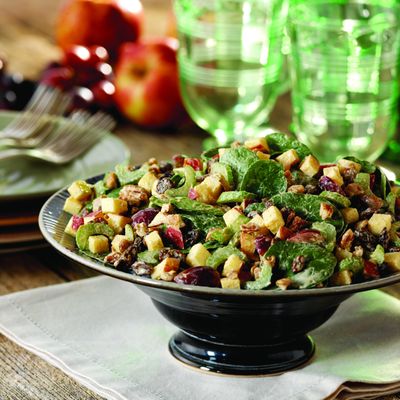Seeking Sustainability?
Choose Organic Food and Enjoy!

Organic, sustainable, all natural, farm-raised … Having trouble deciphering the latest buzz words in the world of food? You are not alone. Sustainable foods are certainly a hot topic, but deciphering the new vernacular is a common issue among shoppers.
Federally regulated since 2002, the term “organic” means food grown using methods that foster the health and harmony of the ecosystem, including the people and animals living in it. Natural and sustainable have no federally regulated definitions for most products. Organic food is produced with:
- No synthetic pesticides, herbicides, or fumigants
- No fertilizers made with synthetic ingredients or sewage sludge
- No genetically modified organisms (GMOs)
- No irradiation
- No hormones, antibiotics, artificial ingredients or trans fats
For many, the word organic means produce such as apples, potatoes, and oranges. But you can find organic varieties of nearly every kind of food. From milk to meats, choosing organic items helps keep potentially dangerous chemicals out of our bodies, and helps protect the environment.
Hints for Living a More Sustainable Lifestyle
Save a Tree. When you hit your local grocery store or neighborhood market, take a reusable fabric tote with you to carry your purchases. If every American used one reusable shopping tote for one shopping trip, we could save about 60,000 trees. Conserve even more carbon by walking to the store!
Buy Organic Foods. Organic agriculture is inherently more sustainable than conventional farming because it is fundamentally designed to work in harmony with natural systems, without the use of potentially harmful chemicals that affect our ecosystems. Even if you just commit to buying one organic food item - like peaches or milk or lettuce - it can help!
Meatless Meal. Meat carries a higher environmental cost for its food value. Producing beef in feedlots requires about 16 times more fossil fuel energy and generates about 24 times more CO2 than the caloric equivalent of vegetables and rice. Choose a great meatless meal once a week - all organic, of course - and enjoy!
Night on the Town. Don’t feel like cooking? More restaurants are cooking with organic ingredients. By rewarding those eateries with your business, you can make a difference right in your own town. If your favorite restaurant isn’t using organic food, let them know you’d like to see it on the menu.
Clean Green. Use natural cleaning products to reduce your exposure to harsh chemicals and toxins, and keep the planet healthier, too.
The importance of organic dairy for the environment
People sometimes choose organic dairy because they prefer the taste, but there’s more to organic dairy than meets the eye. These products represent a larger ecosystem and process that nurtures the soil and responsibly cares for animals that graze on the pesticide-free land. Horizon Organic, the leading organic dairy brand, works with more than 450 farmers across the country and has adopted its own Standards of Care to ensure the integrity and quality of its products.
Chopped Garden Salad with Buttermilk-Blue Cheese Dressing
Serves 6 to 8
Dressing
2 tablespoons minced fresh parsley
1 tablespoon snipped fresh chives
1 clove garlic, minced
1/4 cup mayonnaise
1/4 cup crumbled blue cheese
1/3 cup buttermilk
Salt and freshly ground pepper, to taste
Salad
14 ounces Romaine Hearts, or about 1 head Iceberg lettuce (washed and dried)
1/2 cup sweet peas
1 cup fresh corn
1/2 cup diced zucchini and/or yellow squash
1/2 cup diced carrots
1 cup diced ripe tomato
1/2 cup diced cucumber
1/2 cup diced radish
Combine the dressing ingredients in blender and puree.
If using a head of iceberg, roughly chop lettuce into 1/2-inch pieces. Place in large bowl, add vegetables, and toss to combine.
Add 1/2 cup of dressing, toss to blend, adding more dressing as desired. Serve immediately.
California Waldorf Salad
Serves 4
Dressing
1/3 cup non-fat plain yogurt or sour cream
1/3 cup mayonnaise
2 tablespoons fresh lime juice
1 teaspoon grated lime zest
2 teaspoons curry powder
1/2 teaspoon honey or sugar
Salad
1/2 cup organic celery, thinly sliced
1/2 cup organic raisins
3/4 cup organic seedless grapes, halved
1 organic apple, unpeeled, cut into 1/3-inch dice (1 cup)
1/2 cup pecans or walnuts, toasted
5 ounces organic baby spinach or mixed baby greens (about 6 cups)
Place yogurt, mayonnaise, lime juice, zest, curry, and honey in small bowl, and whisk to combine.
Place celery, raisins, grapes, apple, and nuts in large bowl. Add about half of yogurt dressing, and stir to combine. Just before serving, add spinach and toss to combine. Add more dressing if needed.
For more recipe ideas visit www.horizonorganic.com, www.ebfarm.com, and Spokane.net/Recipes.
Did you know?
Government data shows that the conventional fruits and vegetables below are most likely to carry multiple pesticide residues. Choose organic for these items, especially for infants and children.
• apples
• bell peppers
• celery
• cherries
• imported grapes
• lettuce
• nectarines
• peaches
• pears
• potatoes
• spinach
• strawberries
The folks at Earthbound Farm, who’ve been farming organically for 24 years and whose products are now available in supermarkets across the country, are now offering a Pocket Guide to Choosing Organic - a convenient reference that helps shoppers make smart choices about buying organic produce, defines the term “organic,” and explains the benefits of organic farming. Download the guide at www.ebfarm.com.
All materials courtesy of Earthbound Farm